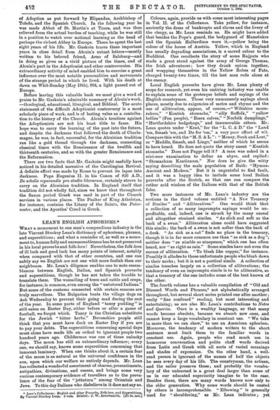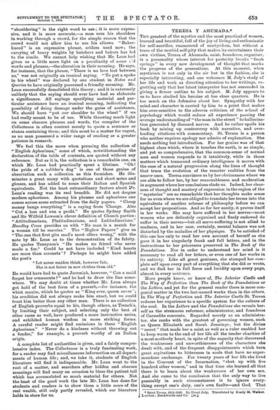WHAT a monument to one man's compendious industry is the
late Vincent Stuckey Lean's dictionary of aphorisms, phrases, and superstitions; and what a reminder of, as well as a monu- ment to, human folly and unreasonableness has he not preserved in his local proverbs and folk-lore ! Nevertheless, the folk-lore of ill luck and good luck has many points of interest, notably when compared with that of other countries, and one can safely say we English are not one whit more foolish than our neighbours. Mr. Lean's diligence enables one to note resem- blances between English, Italian, and Spanish proverbs and superstitions, though he has not taken the trouble to translate them. The wassailing of trees and cattle and crops, for instance, is common, even among the "untutored Indians." But some of the customs connected with certain seasons are truly marvellous. The Bulgarian beats the village dogs on Ash Wednesday to prevent their going mad during the rest of the year. In some parts of England "tansy pudding" is still eaten on Easter Day, either before or after a game of football, we forget which. Tansy is the Christian substitute for the Jewish " bitter herbs." Devonshire people still think that you must have duck on Easter Day if you are to pay your debts. The superstitions concerning special days must alone have made life an ordeal to ignorant people two hundred years ago. Childermas was one of these unlucky days. The moon has still an extraordinary influence ; every one, we should say, knows some superstition concerning that innocent luminary. When one thinks about it, a certain fear of the moon is as natural as the universal confidence in the sun, upon which our welfare so entirely depends. Mr. Lean has collected a wonderful assortment of charms, presentiments, antipathies, divinations, and omens, and brings some very curious contemporary evidence of travellers as to the preva- lence of the fear of the "jettatura " among Orientals and Jews. To this day Italians who disbelieve in it dare not say so.
• Lean's Collectanea: English and other Proverbs, Folk-lore, and Superstitions. By Viucent Stuckey Lean. 5 vols. Bristol: J. W. Arrowsinith. [.£5 Is. net.]
Colours, again, provide us with some most interesting pages in Vol. II. of the Collectanea. Take yellow, for instance, anciently the dress of bankrupts and slaves and the livery of the clergy, as Mr. Lean reminds us. He might have added that besides the Pope's guard, the bodyguard of Mamelukes and the Spanish Halberdiers wore it,—yellow being the colour of the house of Austria. Yellow, which in England has usually degrading associations, is a sacred colour to the Buddhist. One recollects the story of some Rajputs who made a great stand against the army of George Thomas, the Irish adventurer ; how they drank opium together, and wrapping themselves in the Yellow Robes of Fate, charged twenty-two times, till the last man rode alone at the enemy.
Local English proverbs have given Mr. Lean plenty of scope for research, yet even his untiring industry was unable to explain some of the grotesque beliefs and sayings of the English countryman. Those very unmannerly sayings about places, mostly due to exigencies of metre and rhyme and the use of alliteration, appear, of course,—" Wiltshire moon- rakers," "Kentish stomachs," "silly Suffolk," "yellow bellies" (Fen people), "Essex calves," "Norfolk dumplings," "Hertfordshire hedgehogs," and innumerable others. Mr. Lean quotes under "Kent," for the "L. C. & D." the "Land 'em, Smash 'em, and Do for 'em," a very poor effort of wit. Compare this with the "M. S. & L.": "Money, Sunk and Lost," or "Muddle, Smash, and Lingo," neither of which he seems to have heard. He does not quote the story anent "Kentish stomachs." Does not Pegge tell it ? A man was asked in a vivci-voce examination to define an abyss, and replied : " Stomachum Kantianum." Nor does he give the witty saying describing the male population of Bath: "Hymns, Ancient and Modern." But it is ungrateful to find fault, and it was a happy idea to include some local Italian proverbs after the Scotch, so that one can compare the rather acid wisdom of the Italians with that of the British Isles.
Two more instances of Mr. Lean's industry are the sections in the third volume entitled "A New Treasury of Similes" and " Alliteratives." One would think that a collection of so many impromptu sayings would be un- profitable, and, indeed, one is struck by the many unreal and altogether strained similes. "As slick and soft as the back of a swan." Alliteration alone could have suggested this simile ; the back of a swan is not softer than the back of a duck. "As sick as a cat" finds no place in the treasury, though it is in far more common use than "as sick as a dog "; neither does "as nimble as ninepence," which one has often heard, nor "as right as rain." Some similes have not even the excuse of alliteration. "To blush like copper," for instance. Possibly it alludes to those unfortunate people who blush down to their necks ; but it is not a poetical simile. A collection of similes trenches largely on a collection of alliterations; the tendency of even an impromptu simile is to be alliterative, so that a treasury of the one includes some of the best known of the other.
The fourth volume has a valuable compilation of "Old and Disused Words and Phrases," not alphabetically arranged throughout, but several short series printed one after another ; verily "fine confused" reading, but most interesting and entertaining ; as are also Mr. Lean's contributions to Notes and Queries. Ours is a wealthy language, so that many words become obsolete, because we absorb new ones, and cannot keep a large vocabulary in constant use. "We take in more than we can chew," to use an American aphorism. Moreover, the tendency of modern writers to the short sentence must limit them to the familiar words in constant use. Again, people who read much use in humorous conversation and polite chaff words derived from Latin and Greek with all sorts of varied meanings and shades of expression. On the other hand, a well- read person is ignorant of the names of half the objects he sees every day of his life. The countryman, the artisan, and the sailor preserve these ; and probably the vocabu- lary of the unlearned is a great deal larger than some of us in our educated superiority imagine to be the case. Besides these, there are many words known now only to the older generation. Why some words should be ousted by others is incomprehensible. " Elbowing " is generally used for "shouldering," as Mr. Lean indicates ; yet
"shouldering" is the right word to use ; it is more expres- sive, and it is more accurate,—a man uses his shoulders in working through a crowd, for the simple reason that the crowd would not allow him to use his elbows. "Baker- kneed" is an expressive phrase, seldom used now ; the carrying of heavy weights by butchers and bakers has led to the simile. We cannot help wishing that Mr. Lean had given us a little more light on a peculiarity of some cld words and phrases,—the alteration in their meaning. He says, for instance, that the phrase, "There is no love lost between us," was not originally an ironical saying. "To put a spoke in his wheel" was declared by one student in Notes and Queries to have originally possessed a friendly meaning. Mr. Lean successfully demolished this theory ; and it is extremely unlikely that the saying should ever have had so elaborate a significance. All sayings specifying material and par- ticular assistance have an ironical meaning, indicating the possibility of doing damage under the guise of assistance. We should have "put our shoulder to the wheel" if we bad really meant to be of use. While throwing much light on some obscure phrases and words, the compiler of the Collectanea is often content merely to quote a sentence or stanza containing them; and this must be a matter for regret, as no man possessed a wider range of reading or a greater patience in research.
We feel this the more when perusing the collection of "English Aphorisms," some of which, notwithstanding the declaration of the table of contents, are quoted without any reference. But as it is, the collection is a remarkable one, on which Mr. Lean had practically spent a lifetime. "Oh! the pride of a cobbler's dog" is one of those grains of observation such a collection as this furnishes. He illu- minates a great many with quotations and short notes and glosses, and has added to some their Italian and Spanish equivalents. Not the least extraordinary feature about :Tr. Lean's reading was its real breadth. He did not despise modern aphorisms. Among his phrases and aphorisms one comes across some extracted from the daily papers. "Cheap money bangs everything" is a saying from 'Change. Also "Cut a loss and run a profit." He quotes Sydney Smith and Sir Wilfrid La.wson's clever definition of Church parties : "Attitudinarians, Platitudinarians, and Latitudinarians." Handley Cross provides us with "No man is a match for a woman till he marries." The " Biglow Papers" give us "The one that first gits mad's most oilers wrong," with the note by Mr. Lean as to the demonstration of its falsity. He quotes Tennyson's "He makes no friend who never made a foe." Could he not have included "Kind hearts are more than coronets " ? Perhaps he might have added the poet's "Let never maiden think, however fair, She is not fairer in new clothes than old."
He would have had to quote Jeremiah, however, "Can a maid forget her ornaments P " and he had to draw the line some- where. We may doubt at times whether Mr. Lean always got hold of the best form of a proverb,—for instance, the whist maxim, which he quotes as "King ever, queen never"; his erudition did not always make him exact, but we could trust him better than any other man. There is no collection of English proverbs equal to his, though others, as Trench's, by limiting their subject, and selecting only the best of other races as well, have produced a more instructive series, and exhibited human wisdom in more striking forms. A careful reader might find omissions in these "English Aphorisms." "Never do a kindness without throwing out a fender," for example, a proverb worthy of an Italian origin.
A. complete list of authorities is given, and a fairly compre- hensive index. The Collectanea is a truly fascinating work, for a reader may find miscellaneous information on all depart- ments of human life ; and, we take it, students of English literature will find it indispensable. Mr. Lean went to the root of a matter, and searchers after hidden and obscure meanings will find many an occasion to bless the patient toil which has accumulated so much material for others. Not the least of the good work the late Mr. Lean has done for students and readers is to show them a little more of the real wealth, still only partly revealed, which our literature holds in store for us.























































 Previous page
Previous page